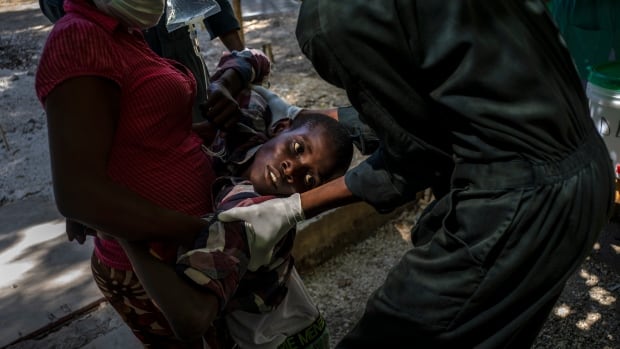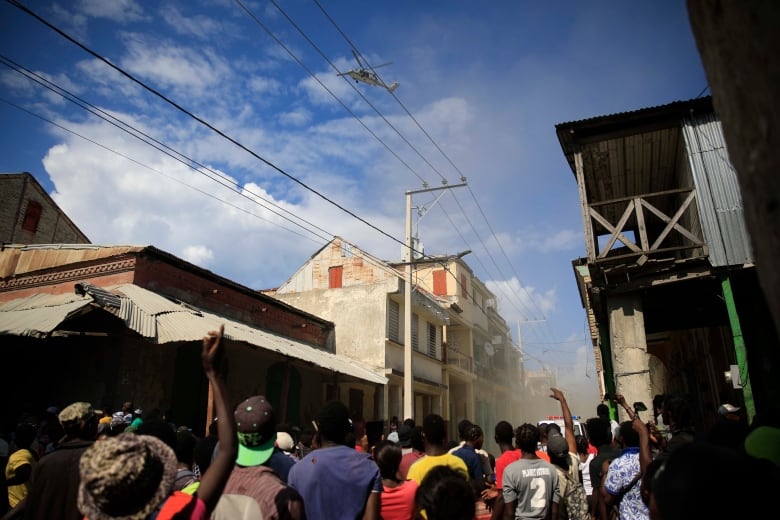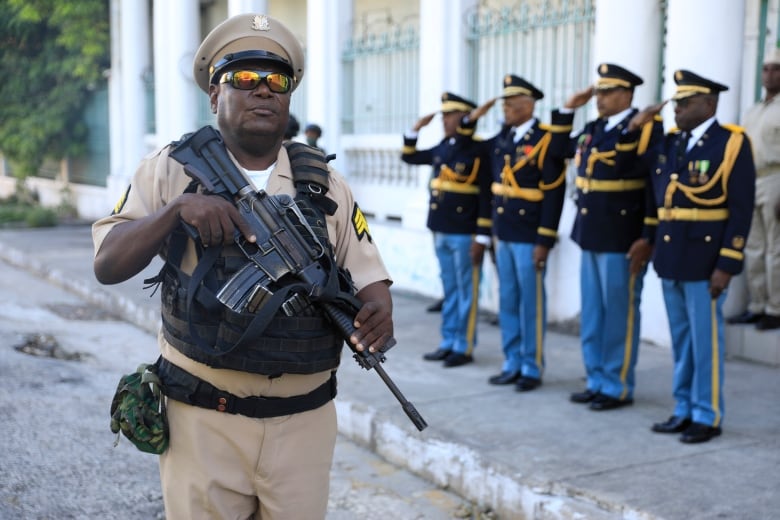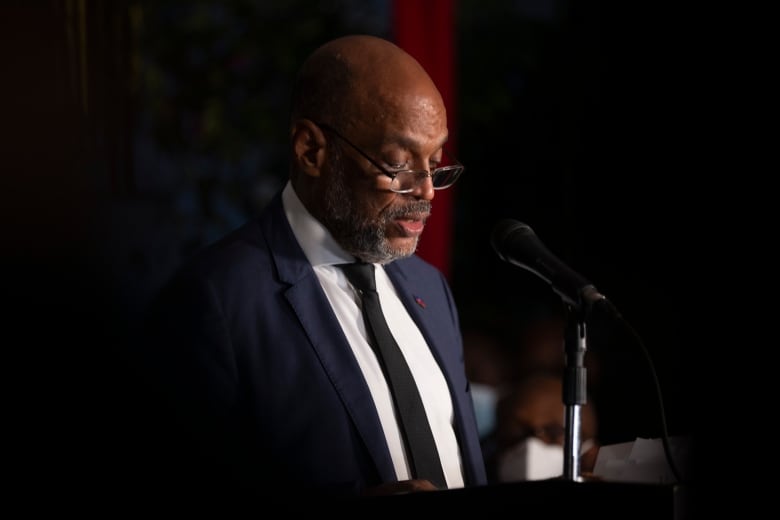
The Trudeau government will be sending more armoured vehicles to Haiti and imposing new sanctions on individuals, says Canada’s ambassador to the UN Bob Rae, who recently returned from a fact-finding mission to the island nation.
Canada is also planning to send three experts to work with the Haitian National Police and make a needs assessment.
Rae’s recent visit to Haiti was his second this year. It followed an earlier fact-finding mission by public servants in response to a U.S. request for Canada to take charge of efforts to save Haiti from anarchy.
The key to Canada’s approach, Rae told CBC News, is to boost and equip the Haitian National Police.
“Now we’re figuring out a way to improve the product that’s going down,” he said. “We are set, there will be more going down. There’s a need for other equipment and there’s a need for more training, and I think for a lot more discussion between us and the National Police about how we deal with the broader issues of the rest of the blockades.”
A blockade of Haiti’s main fuel terminal by the G9 alliance of gangs ended two weeks after Canada and the U.S. sent armoured vehicles to the Haitian police on October 15. That blockade had paralyzed transportation and industry in a country that lacks a reliable power grid and depends heavily on diesel generators.
But the gangs retain control of other territories they’ve seized, including the country’s main courthouse.
“Things are now a bit calmer, but it’s an almost eerie kind of calm, because people are terrified to go out,” said Rae. “The kidnappings are up. They’ve more than doubled over the same time last year.
“And the gangs control easily 70 per cent of Port-au-Prince and significant parts of the rest of the country, and they blockade the main National Highway, which goes from the north to the south. People are living very, very precariously. There’s still a serious food crisis and huge numbers of people living in total poverty.
“So from that perspective, it’s not getting better at all.”
And yet, expectations that Canada will somehow make it better remain high.
‘A leading role’
“We recognize that we will play a leading role in this,” Prime Minister Justin Trudeau said this week, discussing Haiti with La Presse Canadienne.
“This is a challenge that is close to our hearts and there is a level of trust between the Haitian people and the Canadian government that they have less of with other allies elsewhere.”
It’s not just Canada’s long history of involvement in Haiti and its large Haitian diaspora population that have landed the ball in Canada’s court. It’s also pressure from the administration of U.S. President Joe Biden — which has made it clear that it would like to see Canada take charge on Haiti while the U.S. deals with other fires in other parts of the world.
Henry, Haiti’s de facto prime minister, has asked for a foreign military force to enter his country and take on the gangs. Trudeau made it clear that the cavalry is not on the way.
“We have not taken anything off the table, but with 30 years of experience in Haiti, we know very well that there are enormous challenges when it comes to interventions,” he said in French. “It is clear that our approach has to change this time.”
But while the Trudeau government has said a lot about what it doesn’t want to do in Haiti, it’s less clear about what it will do, beyond providing police equipment and sanctions.
Sanctions may be reaching their limit
Canada has significantly stepped up its sanctions over the past month, targeting individuals at the top echelons of power in Haiti.
Those sanctioned include former president Michel Martelly, former prime ministers Laurent Lamothe and Jean Henry Ceant, Haiti’s richest man and only billionaire Gilbert Bigio, and fellow oligarchs Sherif Abdallah and Reynold Deeb.
Canada accuses all six men of seeking to profit from chaos and impunity in Haiti, and of arming and directing gangs to pursue their political and business goals.
The oligarchs are members of Haiti’s famed “fifteen families.” They control much of the economy and, in some cases, own private ports that have been conduits for the smuggling of arms and ammunition onto the island in recent years.
It’s a country where people are afraid to go out, where women are being raped, where kids are being trafficked, where arms are being bandied about and drugs are being sold, used as a smuggling route to the U.S. and beyond. No country can survive like this.– Bob Rae
Once supporters of the dictatorship of the Duvaliers, many of those oligarchs later backed the Parti Haitien Tet Kale (PHTK or “Bald-Headed Party”) of Martelly, in power continually since 2011.
Some also have links to foreign governments. Bigio’s son Reuven acts as consul for the government of Israel in Haiti, while Abdallah represents Italy.
Having extended its sanctions to the top rungs of Haitian society, it’s not clear how much of an effect additional Canadian sanctions could have. Rae said Canada would like to see its allies — including the United States — back Canada up with sanctions of their own.
“We’d like them to join us in doing more, and to figure out a way to develop a stronger common approach that’s not based on supplanting what the national police does,” he told CBC News.
Rae said he’d also like to see allies do more to help the Haitian police combat gangs that seem to have no problem obtaining weapons — “arms, by the way, that are coming in from Miami.”
Haitian opinion split
Not all Haitians are convinced their police force can defeat the gangs, and the country is divided over the prospect of once again having armed foreigners land on its shores.
Violence and desperation have driven many Haitians to put their reservations about foreign domination aside — as the crew of the USS Comfort discovered this week when America’s hospital flagship docked off the port of Jeremie, triggering demonstrations by local people who want the U.S. military to defeat the gangs that are shooting them, rather than just treat their wounds.

But the country also has seen demonstrations against foreign intervention. Pride in Haiti’s hard-won independence is compounded in many cases by suspicion that the foreigners would serve to prop up Henry’s unpopular and unelected government.
If police can’t do the job, and foreigners don’t want to, one option that is already moving forward is the resurrection of Haiti’s long-defunct army.
The army revives
Haiti’s army was once the most powerful institution in the country. It rudely turfed President Jean-Bertrand Aristide from power in a coup in 1991, and its commander Gen. Raoul Cedras ruled as dictator for three years until he was ousted by U.S. pressure.
Aristide returned to power and abolished Haiti’s army in 1995.
But in 2017, the Army was officially relaunched, and in recent months small groups of Haitian soldiers have been training in Mexico.
Rae supports the idea.
“Name me a country around the world that doesn’t have an army,” he told CBC News. “The main thing to recognize right now is that Haiti has a profound security problem.
“It’s a country where people are afraid to go out, where women are being raped, where kids are being trafficked, where arms are being bandied about and drugs are being sold, used as a smuggling route to the U.S. and beyond. No country can survive like this.
“For many years, the Haitian government said they didn’t want to have an army. But now if they want to have an army, fine, let’s talk about what Canada can do, what other countries can do to be of assistance in making those institutions work.”

Rae said a Haitian army could be compatible with Haitian democracy.
“The reason it has a bad reputation is because the Duvaliers used the army as their means of suppressing the population,” he said. “The Dominicans have a very strong army. They also have a thriving democracy. There’s no reason why the country next door can’t have the same thing.”
Haiti’s tiny and poorly-equipped army has so far had little role in fighting the gangs, even after one its officers wept publicly at an event in front of PM Henry as he described his “shame” at being unable to protect the Haitian people.
But so far there has been no Canadian effort to revive the Haitian Army. Instead, the Mexican Army is doing the training.
Restoring democracy
Haiti has delayed elections to the point where it now has almost no elected officials with a real mandate. Of the handful of senators whose terms have yet to expire, two were recently sanctioned by Canada for corruption or links to gangs.
Haiti’s opposition sees Henry as part of the security problem, and foreign governments, the United Nations and NGOs have all agreed that the PHTK has used gangs to try to enforce its rule.
Several opposition groups have united in a coalition known as the Montana Group (after the famous Port-au-Prince hotel where their alliance was formed). Rae met with members of that group while in Haiti.

While the Montana Group sees Henry as determined to cling to power, Rae disagrees.
“I don’t have any sense Mr. Henry wants anything more than to be a transitional leader who will allow the country to have a full and free election in which he will not participate,” he said. “I could prove to be completely wrong, but I don’t sense any burning ambition on his part to run a country.”
Rae said Canada is not encouraging Henry to believe he has unconditional backing. “I think the sanctions are a pretty clear message from Canada and a number of other countries that the day is over when people would turn a blind eye to the rampant corruption of the country because we felt it was really their problem to fix,” he said.
“We all have an obligation to deal with the lack of transparency and the amount of corruption in the country and to name the people who are the bad actors. And the list is not over yet. Believe me, it’s still coming …
“This is a different attitude and different mindset from a number of countries that are really trying to push back on the Haitian elite and say, ‘It’s time for you to get your act together.'”
Little hope in the short term
And so, for Haiti’s long-suffering people, there seems to be little prospect of immediate change.
Trudeau seemed to acknowledge that in his year-end French-language interview with La Presse Canadienne.
“We have a long history in Haiti and 30 years later, we still find ourselves in a crisis just as serious, if not worse, than the others,” he said.
“We know how much making a mistake or doing the wrong thing could make the situation worse and put many people at risk.”
But while Trudeau insisted he doesn’t want to repeat past mistakes, exactly what Canada does plan to do remains unclear — even after those fact-finding missions.